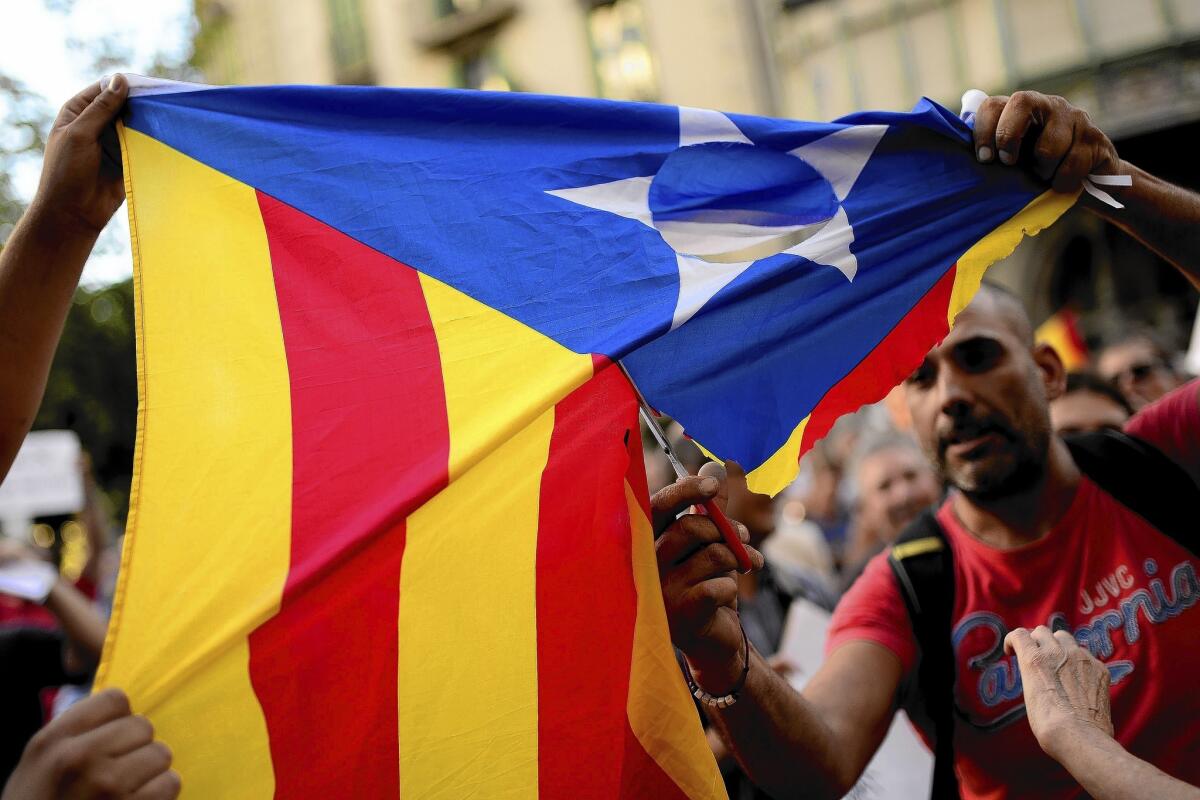Leader of Catalonia region determined to try to secede from Spain

- Share via
reporting from Madrid — Spain’s prime minister failed to strike a compromise Wednesday with the pro-independence leader of Catalonia to keep the northeast region from holding a November referendum on breaking away from Spain.
Catalan President Artur Mas traveled to Madrid for a 21/2 -hour closed-door session with Prime Minister Mariano Rajoy at Moncloa Palace, where Mas said he found “a climate of open dialogue” despite what looked like an icy, awkward handshake between the two men. They had not formally met since August 2013.
“I told him that we are absolutely determined, as I told him a year ago, to hold the consultation,” Mas told reporters afterward, referring to plans for a Nov. 9 referendum on secession from Spain.
Mas said he handed Rajoy a list of 23 demands, including fiscal and education reforms, without which Catalonia would remain unfairly “under-financed.” He spoke to reporters at a Catalan government building across town from the palace, and was interrupted at one point by a protester shouting, “Long live Spain!” in Catalan. There was a heavy police presence outside.
Rajoy did not speak publicly after the meeting. But his office issued a statement saying the prime minister “made clear that the consultation is illegal, that it cannot be held, and that it won’t be held.”
It is unclear how Spain might enforce such a ban if Catalan authorities go ahead with voting in November. Spain’s parliament and Constitutional Court have ruled separately that it is illegal for any Spanish region to hold a referendum on self-determination.
With a population of 7.5 million in Spain’s northeast corner, Catalonia is more populous than some European nations, such as Ireland, Norway or Croatia. It has its own distinct language and culture, as well as a long history of grievances against Spain. Catalans were repressed under Spain’s military dictatorship, which ended in the 1970s.
Catalonia is the country’s wealthiest region, a manufacturing base and source of exports that have helped pull Spain out of recession. Many Catalans believe they pay more than their fair share of taxes to the central government in Madrid, and want more local control.
Polls show more than 70% of Catalans support the region’s plans to hold a referendum in November, though they are about evenly split over whether to secede from Spain.
In the days leading up to Wednesday’s meeting between Rajoy and Mas, Catalan politics have been rattled by an admission by former Catalan President Jordi Pujol, long considered the father of Catalan nationalism and Mas’ political mentor, that he kept a secret off-the-books fortune stashed in tax havens for decades. The 84-year-old Pujol held the top Catalan office for 23 years.
On Tuesday, he resigned as honorary president of Mas’ ruling Convergence and Union party and gave up his pension, office and chauffeur, after he admitted evading taxes tax evasion and paid his tax bill.
Frayer is a special correspondent.
More to Read
Sign up for Essential California
The most important California stories and recommendations in your inbox every morning.
You may occasionally receive promotional content from the Los Angeles Times.













